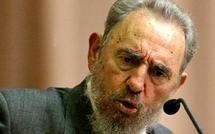
Oil-rich Venezuela is Cuba's key regional ally, and keeps Havana's deeply strained central economy just barely afloat. Hundreds of Cuban doctors in turn work in Venezuela's national health system.
While the United States has made enough loopholes in its own sanctions to become a leading supplier of food to Cuba, most US industrial and manufactured goods still cannot be sold directly to the Americas' lone communist government.
Castro said that in 2006, at the request of Venezuelan President Hugo Chavez, Cuba bought from Philips and Germany's Siemens thousands of pieces of advanced medical equipment for the two countries.
The retired Cuban leader, who left power that year after almost 50 years at Cuba's helm, said Siemens "kept its promises."
But Philips, despite a purchase of 3,553 pieces of equipment worth 72.8 million dollars, did not deliver spare parts due to what Castro said it called "brutal intransigence" on the part of unnamed US authorities.
Only in June did Philips deliver the needed spare parts, Castro said, after it paid a 100,000-euro fine to the Obama government.
"No one has compensated Cubans, or Venezuelan patients under the care of doctors, for the human suffering caused," Castro wrote.
However US law permits states to sell agricultural, medical and information technology products on a cash basis to Cuba. Since 2000, such sales have totaled more than three billion dollars. So Castro charged the United States with violating the loophole it made in its own sanctions.
Castro said Venezuela "is more threatened than ever" by "imperialism" -- usually Cuban shorthand for the United States, so the need for bilateral cooperation was stronger than ever.
Just Thursday the US Treasury eased restrictions on travel and money transfers to Cuba by Cuban-Americans five months after Obama announced the measures in a bid to improve ties with the communist island.
The move also allows US telecommunications network providers to link to Cuba with fiber-optic cables and satellite technology, permits US wireless telephone providers to enter roaming service agreements with Cuban firms, and allows US satellite broadcasts to the island.
When it first announced planned changes in April, the White House said the move was intended to encourage expanding democratic and political rights in Cuba.
---------------------------------------------------------------------------------------------------------------------------
While the United States has made enough loopholes in its own sanctions to become a leading supplier of food to Cuba, most US industrial and manufactured goods still cannot be sold directly to the Americas' lone communist government.
Castro said that in 2006, at the request of Venezuelan President Hugo Chavez, Cuba bought from Philips and Germany's Siemens thousands of pieces of advanced medical equipment for the two countries.
The retired Cuban leader, who left power that year after almost 50 years at Cuba's helm, said Siemens "kept its promises."
But Philips, despite a purchase of 3,553 pieces of equipment worth 72.8 million dollars, did not deliver spare parts due to what Castro said it called "brutal intransigence" on the part of unnamed US authorities.
Only in June did Philips deliver the needed spare parts, Castro said, after it paid a 100,000-euro fine to the Obama government.
"No one has compensated Cubans, or Venezuelan patients under the care of doctors, for the human suffering caused," Castro wrote.
However US law permits states to sell agricultural, medical and information technology products on a cash basis to Cuba. Since 2000, such sales have totaled more than three billion dollars. So Castro charged the United States with violating the loophole it made in its own sanctions.
Castro said Venezuela "is more threatened than ever" by "imperialism" -- usually Cuban shorthand for the United States, so the need for bilateral cooperation was stronger than ever.
Just Thursday the US Treasury eased restrictions on travel and money transfers to Cuba by Cuban-Americans five months after Obama announced the measures in a bid to improve ties with the communist island.
The move also allows US telecommunications network providers to link to Cuba with fiber-optic cables and satellite technology, permits US wireless telephone providers to enter roaming service agreements with Cuban firms, and allows US satellite broadcasts to the island.
When it first announced planned changes in April, the White House said the move was intended to encourage expanding democratic and political rights in Cuba.
---------------------------------------------------------------------------------------------------------------------------









 Home
Home Politics
Politics









